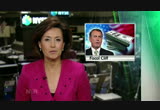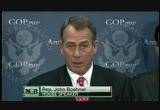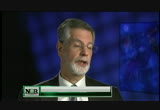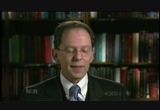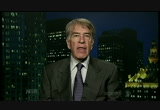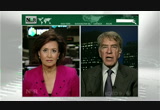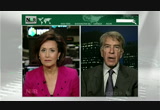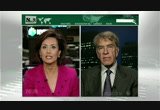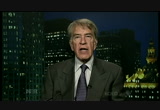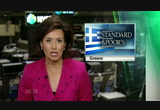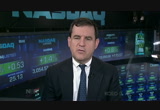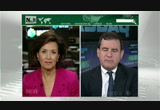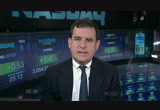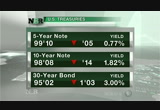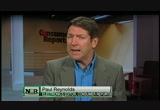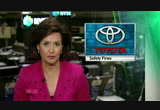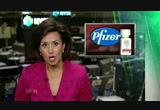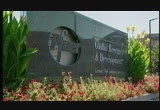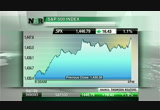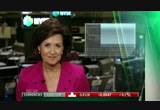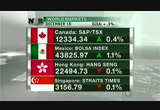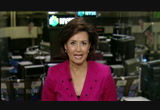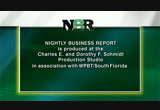tv Nightly Business Report PBS December 19, 2012 1:00am-1:30am PST
1:00 am
john boehner is pushing for his "plan b." this is the latest twist in those crucial fiscal cliff negotiations. the house speaker offered a back-up plan today to avoid falling off the cliff. he promised to bring a bill to the house floor this week that would raise income tax rates for people earning more than $1 million a year and no new spending cuts, for now. the white house immediately rejected it. darren gersh reports. >> reporter: house speaker john boehner says the president is asking for about half a trillion dollars more in taxes than he is willing to cut from spending. that means the two sides have narrowed their differences, but the speaker says not enough progress has been made to call it a deal. so he is making other plans. >> our plan b would protect american taxpayers who make a million dollars or less and have all of their current rates extended. >> reporter: while the speaker prepares his back-up plan, the outlines of a grand bargain with the president are becoming clearer. both sides look ready to adopt a
1:01 am
new inflation indicator that better measures the way consumers shift their purchases when prices rise. >> this is a technical adjustment that supporters of it and outside economists say is meant to make the government's estimates of inflation more accurate. >> reporter: that switch to a chained consumer price index would reduce future benefits for social security, and it would affect the way the i.r.s. sets tax brackets, a move that would raise about $100 billion in new tax revenue over the next decade. eventually, an average family would see its taxes rise by about $75. but tax analysts say the overall impact has to be weighed against other changes the president and congress plan to make. >> what you're also doing as part of this package is raising tax rates or at least allowing tax rates to go back where they were in the clinton years for high income people. that is quite progressive.
1:02 am
this makes it just slightly less progressive, but on balance it's not a bad package. >> reporter: but those tax rate increases are getting smaller. the white house now says it will accept a top rate on income over $400,000. republicans are sticking with a $1 million and up. >> so now you are talking about a subset of what is already a pretty small group of taxpayers. so you're talking about a few hundred thousand taxpayers, probably one way or the other. >> reporter: as the two sides get closer, conservatives are getting nervous. they say lawmakers often promise to cut spending but then back out later. as proof, they argue congress and the president are already using disasters and war spending as loopholes to avoid making tough cuts. >> they are doing that on the one side, then proposing additional stimulus spending on the other side, and then claiming that sometime next year they'll come up with some savings. that's a very troubling formula to me. >> reporter: if a grand bargain doesn't come together in the next few days, we may fall off the fiscal cliff and then wait for a new congress to put the pieces back together in the new year.
1:03 am
darren gersh, "n.b.r.," washington. >> susie: well, roger altman is confident democrats and republicans will strike a deal and avoid falling off the fiscal cliff. he was deputy treasury secretary in the clinton administration and is now executive chairman and founder of evercore partners. >> susie: roger, so great to have you back on "nightly business report." >> thank you, susie. >> susie: nice to see you. why are you so optmistic there is going to be a fiscal cliff deal? >> i would cite two broad reasons, and then a few reasons specific to the negotiations. first on the broadside, the financial markets, as we've all seen over the past seven to nine days, especially the equity markets, have been rallying strongly in anticipation of an agreement. they're looking right past the fiscal cliff towards improved economic growth in 2013 and 2014. of course, they can be
1:04 am
wrong, but on something of this magnitude, they rarely are wrong. second, i think the cost of failure, for both sides, the president and the democrats, and, of course, the republicans, especially in the house, is too great for this to blow up. now, on the microbicide, the pace and the direction of these negotiations is consistent with an ultimate agreement. you saw each side stake out a very aggressive position at the very beginning. there have been at least two rounds of concessions on each side now. for example, speaker boehner agreeing now to a trillion dollars on the revenue side and accepting the idea that rates will go up on some americans, which is an idea that had been fiercely resisted until now. on the president's side, you see he has increased the amount of proposed spending cuts he is prepared to accept. he has raised the threshold at which the new
1:05 am
income rates would kick in to $400,000. both sides are making concession. these aren't easy issues -- in fact, they're very difficult issues, but they're moving towards an agreement. even though we're still 13 days away, that is a millennium in washington for situations like this. so there is lots of time. >> susie: let me pick up on a point that you made about the market view about economic growth is coming for next year and the year after. let's talk about that. because even if there is a deal, there are worries that that deal is going to be a drag on the economy, what with higher tax rates, the removal of the payroll tax cut, possibly. isn't that bad for the economy going forward? >> susie, you're right. there will be some fiscal drag, some contraction, as spending cuts occur, as taxes go up somewhat, and as certain tax cuts, like
1:06 am
the payroll tax cut, expires. but i think there is going to be a big boost to confidence, and i think there is going to be a broad clearing of the air as this issue is resolved. and there has been so much hesitation on the part of employers and businesses on investing and on hiring, i think that's going to be wiped away. and the result -- the net result is going to be an improved growth rate in 2013, and especially big growth rates in 2014 and 2015. >> susie: roger, we have less than a minute and i want to ask you this important question because i think it is true that the uncertainty issue will be gone, but, you know, a lot of the c.e.o.s that i talked to, and i'm sure you hear this a lot, too, from the c.e.o.s you talk with is they're really concerned about growth. all they hear from washington is about tax hikes and spending cuts. how come nobody is talking about how to grow the economy?
1:07 am
>> well, first of all, i think the c.e.o.s of the large corporations are very tuned into this debate. many of them are actually participating directly in the debate in washington. and they're entirely aware of all of the stuff we're talking about right now, and the degree to which an agreement, which i believe we'll see, would clear the air and would free -- would liberate a lot of investment and hiring and expansion. and as far as business in general is concerned, once this is out of the way, all of that talk about tax increases, spending cuts, dysfunction, gridlock, that will disappear. so i think you'll see a better 2013 than 2012. that's not too hard because 2012 has been a very slow year, even before the fourth quarter and into hesitation. i think the outlook beyond this is really pretty good. >> susie: we're going to have to leave it there and that very upbeat note. thank you e very much,
1:08 am
roger. we've been speaking with roch. >> jeff: altman. f coming up tomorrow, we'll talk with one top c.e.o. for his views on the fiscal cliff and what higher taxes and spending cuts mean for his business. stephen roell of johnson controls joins us. >> reporter: pfizer took a big hit this year when its blockbuster cholesterol drug lipitor came off patent. still ahead, the outlook for the generic drug business in 2013. >> susie: on wall street today, another triple-digit gain in blue chip stocks on hopes that a fiscal cliff deal is in the works. investors were also reassured by another positive report from the housing sector. homebuilder confidence hit its highest level since the spring of 2006. but the housing recovery still has a ways to go: index readings above 50 reflect a positive outlook. some encouraging news on europe's economic crisis: standard and poor's gave greece a better grade. it got upgraded to a "b-minus" from "selective default" thanks to reassurances that greece will stay in the eurozone.
1:09 am
on wall street, the dow rose 115 points, the nasdaq gained almost 44, and the s&p added 16. our next guest says any reasonable fiscal cliff deal is better than no deal. he's robert doll, chief equity strategist and senior portfolio manager at nuveen asset management. >> susie: hi, bob. nice to see you again. >> thanks, susie. >> susie: so investors and traders really do seem to think that a deal is coming, like our previous guest, roger altman. is this rally all about hopes for a deal or something nore fundamental? >> it is about hope for a deal. the malaise and the lack of confidence and the uncertainty has been pervasive, as you well know, susie. that has held corporations back from doing things, from spending money, and some individuals as well. as roger said a few minutes ago, if we can clear the air with some sort of fiscal cliff deal, i think that does lift the opportunity for the economy to grow a bit.
1:10 am
>> susie: what if there isn't a deal? does that mean there is going to be a sell-off or a correction in the markets? >> i think the hype in the recent days that a deal is coming is certainly responsible for the rally. i think if there is no deal, and the probabilities of that have gone down, thankfully, but if there is no deal, i still think we're not going to go off some nasty cliff that people are worried about. that is to say, the treasury and the secretary can raise taxes if we get no deal, and the spending cuts can be delayed as well. i'm not convinced that no deal is as awful as people suggest, but let's stay on the bandwagon, the moment for a deal. >> susie: are there any stocks that people should be buying up ahead of a fiscal deal? >> there are too many heavy weight, and have low exposure. i would be buying companies with good free cash flow, some of the big
1:11 am
blue chips that are leaders in their markets. they are the good companies that will make it through the thick and thin of up and down economies and markets. >> susie: does your investment strategy change if we go over the cliff? i want to know what we should be prepared for? >> i would be more cautious if it looks like the talks are falling apart. but i would still be a net buyer because the economy next year is likely to be a bit better next year here in the u.s. and globally. >> susie: we saw that treasury yields rose, and is this a signal to get out of treasures and to put your money into stocks? this has been a safety area for most investors. >> it sure is. i bought a bond and it went up, and why do you want to take this away from me. but i believe in the premises of your question. if, in fact, the economy is a little better, and the financial risks are a little better, that's a recipe for very low
1:12 am
interest rates, for a mild increase in interest rates, which means bond prices go down. i would not be overweight in the treasury area. i would have modest weights and have the rest made up in equity, susie. >> susie: bob, thanks a lot. we look forward to your 10 predictions in 2013. we'll be talking to you about that. robert doll as nuveen as asset management. >> susie: there was a new twist today in the samsung-apple saga over patent disputes.
1:13 am
samsung electronics dropped a critical lawsuit banning the sale of apple products in europe. the good news helped put some shine on apple shares today. the stock gained nearly 3%. still, even though apple now has a green light in europe, it's facing growing competition here at home. suzanne pratt reports. >> reporter: could it possibly be that consumers are souring on apple's iconic iphone? an unscientific survey on the streets of manhattan suggests it's not so. the iphone still looks to be the smartphone of choice. but other evidence tells a different story, namely that samsung's galaxy s3 is making major inroads. cnet editors have just released their annual lineup of this year's best tech products. you guessed it-- the samsung phone with its big screen took the top spot. >> for a long time, the iphone was really the principle
1:14 am
flagship smartphone out there. android phones were catching up very quickly. but this year, we finally have one or two models, especially that samsung galaxy s3, that are just as good if not better to some people. >> reporter: consumers also like motorola's droid razor maxx and lg's optimus phones. but some reviewers say apple did it to itself, annoying users with its proprietary connector, problematic map software, and the iphone's somewhat petite screen. and it's not just the iphone that's losing some of its sweetness with users. in the tablet arena, apple has new competition from google's nexus seven-inch and ten-inch tablets. consumer reports says google's ten-inch is just as good as the full-size ipad. >> it's the first device that we've tested that scored that highly in relation to the ipad. and it has some features that the ipad doesn't have, like g.p.s. and others. and it costs $100 less. >> reporter: nevertheless, there's no denying all of
1:15 am
apple's competitors still trail in one major area, something a lot tougher for apple to lose. >> it still has the greatest cache as a brand. it still has the best... i would say best track record for consistently stylish, efficient design, although some of the other competitors are also being quite innovative in that regard. >> reporter: to that end, look for samsung to try and snazzy up it's image in 2013. experts say if one company has the chance to steal away some of apple's sizzle as well as a lot more market share, it would be samsung. suzanne pratt, "n.b.r.," new york. >> susie: another nick to toyota's reputation. the automaker is paying a record fine, more than $17 million, for failing to promptly report safety defects related to a lexus recall. this is the second time since 2010 that toyota has paid fines for not properly reporting vehicle defects to u.s. regulators.
1:16 am
toyota once had the best reputation for quality and safety, but in the last three years it has announced numerous recalls for separate investigations into sticky pedals, poorly designed floor mats and steering rod problems. >> susie: big changes coming to pfizer. the giant drug maker plans to cut about 20% of its u.s. sales force, or 600 jobs. according to a report from bloomberg, the cuts begin this month and are said to be part of c.e.o. ian read's strategy to reposition pfizer after losing patent protection on its top
1:17 am
selling drug, lipitor. at its peak, that cholesterol drug generated revenues of nearly $10 billion a year for pfizer. while lipitor's loss was tough for pfizer, it was a boon for generic drug makers. but in the coming year, far fewer brand-name drugs will come off patent. and as ruben ramirez reports, generic drug makers have been preparing for the slowdown. >> reporter: 2012 has been a boon for generic drug makers as 40 brand name drugs lost their patent protection, opening the door to what amounted to around $35 billion in sales. 2013 will be a different story, with only about half as many drugs scheduled to lose their patent protections. lipitor, pfizer's blockbuster cholesterol drug, was the biggest seller to lose patent protection this year. >> there are still individual product opportunities in 2013, but i think probably more importantly is we'll see in 2013, which we'll see more of
1:18 am
going forward, is more alternative sources of growth to sort of bolster the traditional u.s. generic source of growth. >> reporter: 2013 could also see industry consolidation as some of the bigger players look to acquire smaller rivals to beef- up their product portfolios. >> it's going to be acquiring the niche companies to help support or enable the development of a particular generic in the market. or it's going to be making strategic partnerships with types of companies that maybe they haven't thought of in the past. >> reporter: in october, watson pharmaceuticals snatched up actavis, opening up new markets in eastern europe and southeast asia. mylan pharmaceuticals could be next to go on a shopping spree; it's sitting on about $4 billion in cash. while generic drug makers explore options for boosting sales, here in the u.s., an aging population and the rollout of the affordable care act could be another growth opportunity. analysts believe the generic
1:19 am
drug makers could see a 40% jump in revenues once the a.c.a. is fully implemented. >> if you look at where a lot of companies are focused today, it is in the disease states that are relevant to an aging population. >> reporter: new drugs and new markets may help spark revenue growth, but the 10,000-pound gorilla is a newer category of products known as bio-similars, which are proteins made in living cells that are oftentimes used to treat cancer. they are a lot more difficult to copy but could also carry fatter profit margins. ruben ramirez, "n.b.r.," new york. >> susie: on wall street progress on the fiscal cliff negotiations sparked broad-based gains on wall street, helping the major indices close at post- election highs. the s&p 500 rally got going about an hour after the homebuilders confidence survey was released, moving higher for an eighth straight month. the s&p finished up 0.9%. trading volume picked up. 817 million shares moved on the big board, just over two billion traded on the nasdaq. nine of the ten major stock
1:20 am
sectors were higher. energy and technology led the way, gaining 1.7% each. the financial sector added another 1.5% to yesterday's rally. two beaten down tech stocks helped that sector: apple and hewlett-packard. apple stock bounced 2.9%. it hit a ten month low last friday. hewlett-packard is the worst performing dow stock this year. today, shares gained 2.2%. after the closing bell, software giant oracle posted fiscal second quarter earnings of 64 cents per share, stronger than wall street analysts expected. it continues seeing strength in its traditional database software business. oracle shares closed the regular session up almost 2%. shares added almost another 2% in extended hours trading. if that holds through tomorrow's opening bell, it would be a new yearly high for oracle stock. two of the most important companies in the media industry want to merge, but you may not recognize their names. nielsen is known for its television ratings. arbitron does the same for
1:21 am
radio. nielsen today offered $1.3 billion in cash for arbitron, or $48 per share. shares of arbitron jumped on heavy volume, up 23.6%. federal regulators would have to okay any tie-up between the two companies. nielsen shareholders welcomed the deal. its stock jumped 4.4%. shares of u.s. tobacco companies were under pressure, ahead of a report due out in europe tomorrow. regulators there are said to be preparing new rules on health warnings and could move to ban tobacco flavors like menthol. lorillard stock dropped 2.3%. its biggest seller: menthol- flavored newport cigarettes. reynolds' american makes brands like camel and kool. its shares fell 2.2%. and altria group was down 1.2%. it makes marlboro cigarettes. amgen today admitted to mis- branding its medicine for anemia. as part of the federal plea deal, the company agreed to pay $762 million in criminal and civil penalties.
1:22 am
the stock didn't have much of a reaction, though. shares were down just 0.2%. they have seen a strong rally this year, rising almost 40% since january. we have a closer look at whether amgen can continue to rally. it is on our web site, www.nbr.com. click on the "blogs" tab and look for technical analysis by michael kahn. the yellow metal saw plenty of red. all of the five most actively traded exchange traded products ended higher. the financial sector and nasdaq 100 tracking funds gained the most, up 1.5% each. and that's tonight's "market focus."
1:23 am
>> susie: super bowl advertisements are known for being some of the most expensive ads on tv, and the same is true for the online ads that will be featured when they are streamed online this february. rick horrow has details in this week's "beyond the scoreboard." >> the n.f.l. has promised the super bowl won't be going on cable tv anytime soon, but one place the game has migrated to is the internet. february's super bowl will be only the second in history to be available online, and the ad buying frenzy is just as hot in cyberspace as it is on tv. cbssports.com is nearly sold out of advertising space for its live-streaming of this year's super bowl. the going rate for ad space in the streaming is an estimated $1 million-- not bad considering a 30-second tv ad goes for $4 million during the game. the online audience is just a
1:24 am
fraction of the main broadcast-- two million viewers on the internet compared to 110 million on tv. and what will viewers see online they won't on tv? cbs is investing in unique camera angles and integration with social media. advertisers love it because it can better track the return on their advertising investments. cbssports.com loves it because it creates another revenue stream to fuel profits for cbs shareholders. i'm rick horrow. >> susie: coming up tomorrow on "n.b.r.": we'll look at the why sales of beauty products are looking good this year, but you might be surprised who they're for. also tomorrow, we'll be tracking some earnings reports from fedex, general mills and bed bath and beyond. and finally tonight, some good news on bonuses. a new survey shows nearly three out of every four employers will be handing them out this year. outplacement firm challenger gray and christmas says 72% of employers plan to offer some type of year end bonus this year. that's up from only 53% last year.
1:25 am
and even better, many companies handing out bonuses say this year's thank you check will be bigger than last year. and that's "nightly business report" for tuesday, december 18. have a great evening, everyone. we'll see you online at www.nbr.com and back here tomorrow night. captioning sponsored by wpbt captioned by media access group at wgbh access.wgbh.org
1:29 am
tonight on spark. glass, paper, wood. no matter what the medium, the process of creating works by hand can be mesmerizing. the end product, miraculous. in our first story, wood artist gary stevens traces the lifelines of centuries-old redwood trees to discover the extraordinary forms hidden within. >> you won't find any wood like it. the ta patina's that seeped into the grains of the wood are just spectacular. >> in our second story, turning moten glass into works of lyrical beauty with glass artist pamina traylor.
130 Views
IN COLLECTIONS
KQED (PBS) Television Archive
Television Archive  Television Archive News Search Service
Television Archive News Search Service 
Uploaded by TV Archive on

 Live Music Archive
Live Music Archive Librivox Free Audio
Librivox Free Audio Metropolitan Museum
Metropolitan Museum Cleveland Museum of Art
Cleveland Museum of Art Internet Arcade
Internet Arcade Console Living Room
Console Living Room Books to Borrow
Books to Borrow Open Library
Open Library TV News
TV News Understanding 9/11
Understanding 9/11